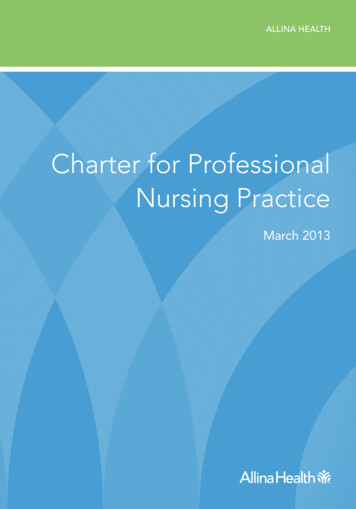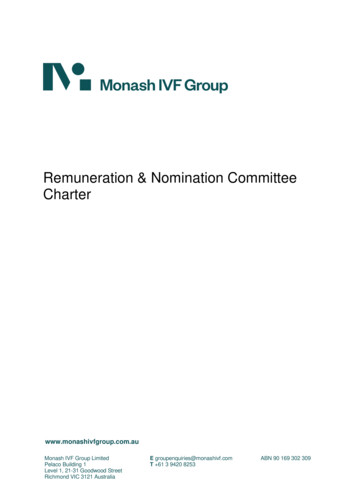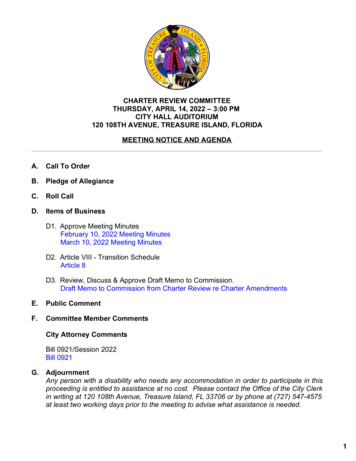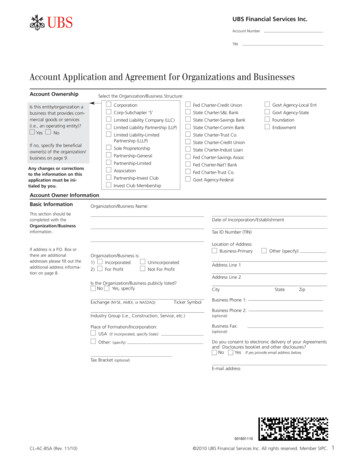
Transcription
Allina HealthCharter for ProfessionalNursing PracticeMarch 2013
ContentsNursing Vision. 3Nursing Goals. 3Introduction. 4Nursing Core Beliefs. 5Professional Nursing. 6Scope of Nursing Practice. 7Professional Nursing Governance. 8Professional Nursing Development. 8Nursing Research. 9Systems Support. 9Dimensions that Guide Practice. 9Definition of Terms. 10 2
Nursing VisionWe will be exceptional advocates, partners and providers of nursing care.Nursing Goals1. Support a professional nursing practice environment that fosters personalaccountability to incorporate evidence-based practice into daily practice Define core best practice standards as a base for system wide Nursingperformance improvement Encourage, support and celebrate certification and degree advancementand completion Create an evidence-based practice culture that is readily accessible and sharedacross the system Establish an environment in which all nurses share the responsibility toparticipate in the advancement of their professional practice to help themachieve their highest potential2. Develop and support exceptional nurse leaders which enhances visionary andtransformational* (see definition) leadership skills Provide a comprehensive, individualized, evidence based leadership program forpotential and current nursing leaders Provide leadership / mentorship development opportunities for bedside nurses3. Foster a nursing culture that consistently and reliably delivers the highestoutcomes of patient care and service Collaborate jointly in identifying learning needs and resolving system barriersthat impact the quality and safety of care delivered Promote a healing and caring environment that is inclusive of the patient andfamily experience, health care team and broader community4. Establish a system wide professional nursing development path Support the infrastructure(s) that provide opportunities for bedside nursesto engage in clinical care and process improvement activities Promote utilization of clinical resources to support professional growthand development 3
IntroductionThe Charter for Professional Nursing Practice is the common framework for allprofessional registered nurses (RNs) within Allina Health to strengthen excellencein patient care, to provide a shared understanding of professional practice to ensureconsistency in practice across settings. The Charter clarifies the essential elementswhich guide our practice, aligns nurses with Allina’s Nursing vision and nursingstrategies and provides a context for the RN’s role in the achievement of the carestrategies of Allina Health.The Charter is a living document with a long and rich history of partnership andcommunication between Minnesota Nurses Association (MNA) and Nursingleadership. The roots of the document began in 1998 with an assessment acrossthe Allina Health System and the varied practice settings of the professional nurse.The goal of the assessment was to identify the common elements that transcendedlocation or setting, yet strengthened Nursing practice and the provision of qualitypatient care. The first draft was presented at the Allina Nursing Practice Conferencein May 2000.Since inception, the Charter has promoted excellence in Nursing and has beenused in recruitment and hiring, job descriptions, role clarifications and competencydevelopment. The Charter provides a framework for orientation and clarification ofthe professional nurse’s role in any practice setting across the organization.The key elements of the Charter for Professional Nursing Practice include:Allina Nursing VisionAllina Nursing Strategic GoalsNursing Core BeliefsDefinition of Professional NursingScope of Nursing PracticeProfessional Nursing GovernanceProfessional Nursing DevelopmentNursing ResearchSystems SupportDimensions That Guide PracticeDefinition of Terms 4
Nursing Core BeliefsAdvocacyThe nurse’s primary commitment is to the patient, whether an individual, family, orgroup. The nurse promotes, advocates for, and strives to protect the health, safety, andrights of the patient. (MNA Position Statement-Advocacy 7/03)CaringCaring is the essence of Nursing practice and provides the foundation for a healingenvironment and healing interactions. The five caring processes outlined by caringtheorist Kristen Swanson, RN, PHD, FAAN are accepted and integrated into AllinaNursing practice. They include: maintaining belief or a sustaining faith in the patient’s capacity to get throughevents or transitions and face a future of fulfillment knowing each patient or striving to understand events as they have meaning inhis/her life enabling or facilitating the passage of our patients through life transitions andunfamiliar events being with or being emotionally present to patients doing for patients as they would do for themselves if it were possible.Caring is valued not merely as a means to an end but as a process with inherent moralsignificance which transcends the goal of curing.Continuous ImprovementContinuous improvement in care and service to patients and families is achieved byapplying expertise, creativity, and critical thinking and is enhanced through research,continuous learning and quality improvement processes.Cultural Awareness and RecognitionCultural awareness and recognition that the nurse-patient encounters include theinteraction of three cultural systems: the culture of the nurse, the culture of thepatient, and the culture of the setting.EthicsEthics are an integral part of the foundation of nursing. Nursing has a distinct code ofethics that articulates the profession’s non-negotiable ethical standard. The Code ofEthics for nurses is an expression of nursing’s own understanding of its commitmentto society, as well as its duties to self, including the responsibility to preserve integrity 5
and safety, to maintain competence, and to continue personal and professionalgrowth. Individuals who become nurses are expected not only to adhere to the idealsand moral norms of the profession, but also to embrace them as part of what itmeans to be a nurse. (American Nurses Association [ANA] Code of Ethics for Nurses withInterpretive Statements, 2010)LeadershipLeadership produces the foundation for mutual respect and collaboration and isessential for professional practice to thrive. Effective leaders are value driven, patientfocused and model caring and display integrity during all interactions.RelationshipsRelationships that are mutually respectful and collaborative with patients and theirloved ones, physicians, and other members of the health care team enhance care andservice to all of those we serve.StewardshipStewardship requires that as agents of limited health care resources, nurses havean obligation to manage resources to assure they will be accessible to others inthe future.Professional Nursing (Registered Nurse)Nursing is the protection, promotion, and optimization of health and abilities,prevention of illness and injury, alleviation of suffering through the diagnosis andtreatment of human response, and advocacy in the care of individuals, families,communities and populations. (ANA Social Policy Statement, 2003)The “practice of professional nursing” means the performance of: (1) providing anursing assessment of the actual or potential health needs of individuals, families,and communities; (2) providing nursing care supportive to or restorative of life byfunctions such as skilled ministration of nursing care, supervising and teachingnursing personnel, health teaching and counseling, case finding, and referral to otherhealth resources; and (3) evaluating these actions.The practice of professional nursing includes interdependent and independentnursing services as well as delegated medical services / functions which may beperformed in collaboration with other health team members, or may be delegatedby the professional nurse to other nursing personnel. (Minnesota Nurse Practice Act,Minnesota Statutes 2004) 6
Nursing services are divided into three categories:1. Delegated - Services which enhance the health of a person and require aphysician’s order;2. Interdependent - Services which enhance health by assessing, monitoring,detecting and preventing complications associated with certain health situationsor treatments; and3. Independent - Services which enhance health by assessing, monitoring, detecting,diagnosing, and treating the human responses to health status or situation.(Wesorick, 1986)Scope of Nursing PracticeProfessional NursingProfessional nursing exists to provide care and service to individuals and their lovedones in collaboration with others. It is achieved through the blending of clinicalexcellence, caring, and compassion in helping people to maintain health, effecthealing, cope with stressful circumstances, and experience a dignified, personalizedand peaceful death.Professional nursing has one scope of practice, which encompasses the range ofactivities from those of the beginning registered nurse through the advanced level.While a single scope of professional nursing practice exists, the depth and breadthto which individual nurses engage in the total scope of professional nursing practiceis dependent on their educational preparation, their experience, their role, and thenature of the patient population they serve. Professional nursing’s scope of practice isdynamic and continually evolving.Nursing care is provided and directed by registered nurses and advanced practiceregistered nurses. Professional nursing is performed in collaboration with otherhealth care professionals.As a leader and coordinator of care, the professional nurse has the responsibility,authority and accountability for assessing, planning, implementing, coordinating andevaluating the care for patients and their loved ones.Other Nursing RolesDifferentiation of practice among RNs, licensed practical nurses (LPNs), and othercare providers is based on the legal scope of practice and the role and educationalpreparation of the care provider. 7
Delegation Delegation means the transfer of responsibility for the performance of an activityfrom one individual to another, while the delegator retains accountability for theoutcome (ANA Scope & Standards of Practice, 2010 Edition). All decisions to delegatemust be based on the safety and welfare of the public and patient. The individual RN has the professional, ethical, and legal autonomy to delegatethose aspects of nursing care which the RN determines are appropriate based on hisor her assessment. The RN determines and is accountable for the appropriatenessof the delegated nursing task. (MNA Position Paper: Delegation and Supervision ofNursing Activities, 1997) The RN has the authority to determine which nursing functions to delegate toother nursing personnel. The LPN provides nursing care as delegated and underthe supervision of a RN. LPNs have the responsibility and accountability for theiractions in providing patient care within their scope of practice. As valued partnersto professional registered nurses and as important members of the health care team,LPNs and paraprofessional roles provide care in accordance with their legal scope ofpractice and educational preparation.Professional Nursing GovernanceThe primary accountability of Professional Nursing practice is to provide a structureand process of ensuring evidence based practice, ensuring competency and evaluatingand improving nursing care. The professional nurse participates in interdisciplinarydecision making related to patient care and organizational processes. In the nursingleadership structure, communication is collaborative, collegial and invites innovativeoutcomes.Professional Nursing DevelopmentThe professional nurse strives not only to maintain competency but actively seeksadditional advanced knowledge and experience. Participation in ongoing education,review of technological advances, conferences, and interdisciplinary professionalmeetings support improved quality based practice. The professional nurse contributesto a supportive and healthy practice environment through sharing knowledge andskills with colleagues, providing constructive feedback and mentoring others withinthe health care team. The nurse has a duty to ensure safety of self. Finally, theprofessional nurse is encouraged to actively seek constructive feedback, engage inself-appraisal and create goals for one’s own development. 8
Nursing ResearchNursing care is evidence-based, knowledge-driven and reflects current researchfindings. Professional nurses collaborate with nurse researchers for improvementsin clinical practice. Use of quality improvement tools is the basis for development ofresearch activities. Involvement in and utilization of nursing research is evident inpatient care outcomes.Systems SupportIn order to provide quality care in a supportive, healing environment, the organizationmust ensure effective and efficient systems to support the delivery of care. Thesesystems include, but are not limited to: Recruitment and Retention – programs that attract and retain the most talentedpeople in the field and invest in the ongoing development of the practicing nurse. Documentation – systems that are streamlined and assist the nurse to clearlyarticulate a well-coordinated plan of care that addresses holistic needs. Staffing – processes that are proactive and dynamic, to ensure staffing plans andallocation of appropriate staff resources that are responsive to continually changingpatient care needs. Scheduling – procedures that support patient care requirements while promotingstaff satisfaction and work-life balance. Management – practices that advocate ethical shared decision making, advanceprofessional development, and remove barriers and ensure appropriate resourceallocation to enable nurses to effectively provide quality care for patients andtheir families.Dimensions That Guide PracticeThe elements that define and support nursing practice, including the beliefs andstandards that set the ethical and legal parameters of practice include: Allina Health Mission, Vision and ValuesANA Bill of Rights for Registered Nurses (2001)ANA Code of Ethics for Nurse with Interpretive Statements (2010)ANA Nursing: Scope and Standards of Practice (2010)ANA Nursing’s Social Policy Statement (2003)Minnesota Nurse Practice Act (2004)Minnesota Nurses Association Position PapersProfessional Specialty StandardsRegulatory StandardsWisconsin Nurse Practice Act 9
Definition of TermsTransformational LeadershipTransformational leadership is a theory that was developed by James McGregor Burnsin 1978. He developed this theory to further address the aspects of an organizationthat lead to success, encourage enthusiasm among an organization’s employees, andidentify the values employees place on their work. The transformational leadershipstyle inspires others to develop and implement effective leadership characteristics.The ultimate goal of transformational leadership is for the leader and the followerto discover meaning and purpose in relation to their work, in addition to growthand maturity.Registered NurseAbbreviated RN, an individual licensed by the board to practice professional nursing(see definition of professional nursing section).Licensed Practical Nurse:Abbreviated LPN, an individual licensed by the board to practice practical nursing.The practice of practical nursing (LPN) means the performance for compensationor personal profit of any of those services in observing and caring for the ill, injured,or infirm, in applying counsel and procedure to safeguard life and health, inadministering medication and treatment prescribed by a licensed health professional,which are commonly performed by licensed practical nurses and which requirespecialized knowledge and skill such as are taught or acquired in an approved schoolof practical nursing, but which do not require the specialized education, knowledge,and skill of a registered nurse. (Minnesota Nurse Practice Act, 2004)Nursing Assistant/Unlicensed PersonnelNursing Assistant means an individual providing nursing or nursing-related servicesthat do not require the specialized knowledge and skill of a nurse, at the directionof a nurse, but does not include a licensed health professional or an individual whovolunteers to provide such services without monetary compensation. (MinnesotaNurse Practice Act, 2001) Unlicensed caregivers are accountable for their performancebased on their job description, identified competencies, and policies and procedures. 10
Author AcknowledgementThanks to the authors of the original Charter in2000, the 2004 Charter Revision Workgroup,members of the 2008 Allina Clinical NursingPractice Council, members of the 2012 AllinaClinical Nursing Practice Council and all whosefeedback has shaped this practice document. 11
allinahealth.orgS411829 15769 0413 2013 ALLINA HEALTH SYSTEM. TM A TRADEMARK OF ALLINA HEALTH SYSTEM
The Charter clarifies the essential elements which guide our practice, aligns nurses with Allina's Nursing vision and nursing strategies and provides a context for the RN's role in the achievement of the care strategies of Allina Health. The Charter is a living document with a long and rich history of partnership and











